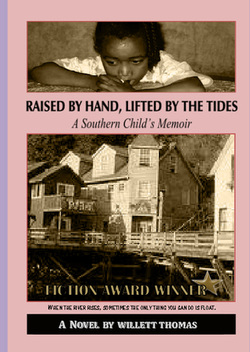
* * * *
I was provided a copy of this book through Goodreads’ READ IT AND REAP program in exchange for my fair and honest review. I thank the author for this opportunity.
I often ask myself what is at the heart of my rating for a particular work. What is it that moves a book from the middle of the pack up to a four or five star status? I think that if I had to settle on one thing, it would be that a book that ranks higher for me is one that I am hesitant to put down, one to which I look forward to returning, one to which I find my thoughts returning when I am not busy reading, one I am sorry to see come to an end. . . . Raised by Hand was such a read.
At the outset, I note that there were few editing errors in this work, making it a genuine pleasure to read.
The introduction to Raised by Hand references Charles Dickens’s use, in Great Expectations, of the phrase “raised by hand.” I loved that read and found therein, Pip’s discussion of what it meant to be “raised by hand” thoroughly engaging. Indeed, it made me laugh so hard, tears ran down my face! While Thomas’s work is altogether different from Dickens’s work, both tell the story of a young one raised by someone other than that child’s mother and both tell the story from that child’s perspective.
The story opens with a child’s request: “First, call me Lilly—no matter your inclination.” Here we get our first glimpse at how the desires of a child may differ from how things will operate in real life because, of course, Lilly is known by everyone, throughout, as “Lil Bit.”
My favorite thing about Raised by Hand was that Lil Bit gave voice to the story and that Lil Bit’s voice was consistent throughout. The same “dialect” used in the dialogue was found in the commentary. This is difficult to do because the rules of grammar do not apply in quite the same way. That is, what would have been “proper grammar” if the story had been told from an outsider looking in, would not have been proper for the voice of Lil Bit. In some ways, this makes the reading more difficult, but for Raised by Hand, this approach effectively set the stage.
The setting was the 1930’s south. While not drastically poor, neither was there any extravagance to the characters, to Bubbah’s home for Lil Bit, or to the larger community of Arcadia. These simple people and places were drawn clearly through such statements as: “Bubbah had been married to Uncle Bobby’s daddy, Mr. Dalton, for ten years til the two went their separate ways, leaving Bubbah with the Buick and the house, and Mr. Dalton with a near full book of Green Stamps.” Or, like this one: “He wore a coat as if it was cold and not Florida in the summer. He wore it across his shoulders like a cape. Around the collar there was a dead animal, squirrel or, perhaps, another close rodent relation.” And finally, consider: “Bubbah, herself, was the product of a Dalton straddling the color line.”
I very much appreciated the attention to detail in Thomas’s story—those little touches that made the story so “real.” For example, when the sheriff brings Lil Bit home, his hand cupped around the scruff of her neck, we find that “his jacket, coated with the faint scent of King James cigars and Vitalis” hung loosely across Lil Bit’s shoulders. Or, when Bubbah requests Lil Bit to put something back in its place, we read: “I placed it carefully back atop the mantle, alongside Bubbah’s framed pictures of Our Lord Jesus Christ, Miss Eleanor, President Roosevelt’s Missus, and her [Bubbah’s] Tommy, along with all his [Tommy’s] letters, bundled and tied with blue ribbon, their envelopes yellowed with the passage of time.” Finally, consider: “Since her last visit to the beauty parlor, Bubbah’s hair was quite poofy, spring loaded from temples to nape with wiry gray hairs, each strand appearing ready to do whatever necessary to dominate.”
Because Raised by Hand is told from an innocent child’s perspective, we are served up some very funny lines—though Lil Bit may not have intended for them to be such. Consider, for example a reference to a dishonest person: “That, and if he was ever to try and shake her hand, you’d best bet she’d count her fingers, then, too. . . .” Another example, in reference to Lil Bit’s best friend, Tippett: “I still could think of no sufficient reason why he shouldn’t continue in his role as my shadow. Ghost, really, with him being white.” Actually, numerous scenes made me laugh out loud. I especially liked when Bubbah is surprised that Lil Bit doesn’t want some bun to eat. Bubbah looks at the buns, “unsure whether with my child’s eye I had spotted something she had missed and, perhaps, swallowed.” And I liked when Uncle Bobby gave Lil Bit a birthday present of new flip-flops: “Barely able to keep from tripping over the tufts of grass, I now wore only my newly acquired size eight women’s flip-flips on my size three kid’s feet.” All said, my favorite funny bits, the parts that not only had me laughing out loud, but that I also shared with others, were when Uncle Bobby met Lil Bit’s new teacher, Miss Dare, and the encounters between Lil Bit and the new girl in town, Beneatha Atwell.
Raised by Hand offers interesting and well drawn characters, a glimpse into the world of the old south and a bit of a mystery. It is an engaging read from start to finish. Well done, Willett Thomas!
I often ask myself what is at the heart of my rating for a particular work. What is it that moves a book from the middle of the pack up to a four or five star status? I think that if I had to settle on one thing, it would be that a book that ranks higher for me is one that I am hesitant to put down, one to which I look forward to returning, one to which I find my thoughts returning when I am not busy reading, one I am sorry to see come to an end. . . . Raised by Hand was such a read.
At the outset, I note that there were few editing errors in this work, making it a genuine pleasure to read.
The introduction to Raised by Hand references Charles Dickens’s use, in Great Expectations, of the phrase “raised by hand.” I loved that read and found therein, Pip’s discussion of what it meant to be “raised by hand” thoroughly engaging. Indeed, it made me laugh so hard, tears ran down my face! While Thomas’s work is altogether different from Dickens’s work, both tell the story of a young one raised by someone other than that child’s mother and both tell the story from that child’s perspective.
The story opens with a child’s request: “First, call me Lilly—no matter your inclination.” Here we get our first glimpse at how the desires of a child may differ from how things will operate in real life because, of course, Lilly is known by everyone, throughout, as “Lil Bit.”
My favorite thing about Raised by Hand was that Lil Bit gave voice to the story and that Lil Bit’s voice was consistent throughout. The same “dialect” used in the dialogue was found in the commentary. This is difficult to do because the rules of grammar do not apply in quite the same way. That is, what would have been “proper grammar” if the story had been told from an outsider looking in, would not have been proper for the voice of Lil Bit. In some ways, this makes the reading more difficult, but for Raised by Hand, this approach effectively set the stage.
The setting was the 1930’s south. While not drastically poor, neither was there any extravagance to the characters, to Bubbah’s home for Lil Bit, or to the larger community of Arcadia. These simple people and places were drawn clearly through such statements as: “Bubbah had been married to Uncle Bobby’s daddy, Mr. Dalton, for ten years til the two went their separate ways, leaving Bubbah with the Buick and the house, and Mr. Dalton with a near full book of Green Stamps.” Or, like this one: “He wore a coat as if it was cold and not Florida in the summer. He wore it across his shoulders like a cape. Around the collar there was a dead animal, squirrel or, perhaps, another close rodent relation.” And finally, consider: “Bubbah, herself, was the product of a Dalton straddling the color line.”
I very much appreciated the attention to detail in Thomas’s story—those little touches that made the story so “real.” For example, when the sheriff brings Lil Bit home, his hand cupped around the scruff of her neck, we find that “his jacket, coated with the faint scent of King James cigars and Vitalis” hung loosely across Lil Bit’s shoulders. Or, when Bubbah requests Lil Bit to put something back in its place, we read: “I placed it carefully back atop the mantle, alongside Bubbah’s framed pictures of Our Lord Jesus Christ, Miss Eleanor, President Roosevelt’s Missus, and her [Bubbah’s] Tommy, along with all his [Tommy’s] letters, bundled and tied with blue ribbon, their envelopes yellowed with the passage of time.” Finally, consider: “Since her last visit to the beauty parlor, Bubbah’s hair was quite poofy, spring loaded from temples to nape with wiry gray hairs, each strand appearing ready to do whatever necessary to dominate.”
Because Raised by Hand is told from an innocent child’s perspective, we are served up some very funny lines—though Lil Bit may not have intended for them to be such. Consider, for example a reference to a dishonest person: “That, and if he was ever to try and shake her hand, you’d best bet she’d count her fingers, then, too. . . .” Another example, in reference to Lil Bit’s best friend, Tippett: “I still could think of no sufficient reason why he shouldn’t continue in his role as my shadow. Ghost, really, with him being white.” Actually, numerous scenes made me laugh out loud. I especially liked when Bubbah is surprised that Lil Bit doesn’t want some bun to eat. Bubbah looks at the buns, “unsure whether with my child’s eye I had spotted something she had missed and, perhaps, swallowed.” And I liked when Uncle Bobby gave Lil Bit a birthday present of new flip-flops: “Barely able to keep from tripping over the tufts of grass, I now wore only my newly acquired size eight women’s flip-flips on my size three kid’s feet.” All said, my favorite funny bits, the parts that not only had me laughing out loud, but that I also shared with others, were when Uncle Bobby met Lil Bit’s new teacher, Miss Dare, and the encounters between Lil Bit and the new girl in town, Beneatha Atwell.
Raised by Hand offers interesting and well drawn characters, a glimpse into the world of the old south and a bit of a mystery. It is an engaging read from start to finish. Well done, Willett Thomas!
Find out more here.


